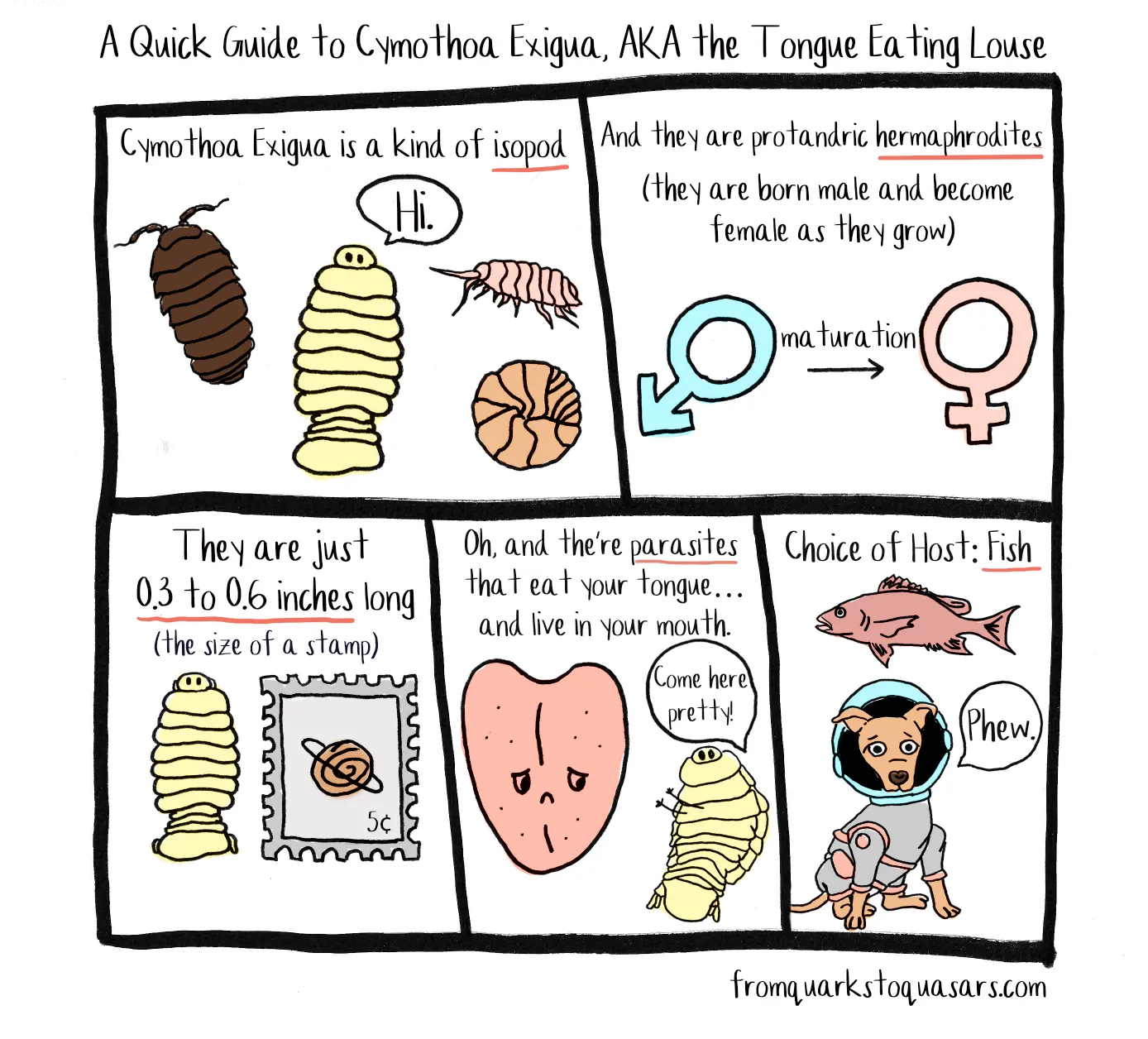And so, for every wonder, there is a nightmare. There are deadly solar storms, black holes, and even parasites that eat your tongue — yes, really.
Cymothoa exigua is a parasitic isopods that bears a disturbing resemblance to the Chestbursters from Alien. You know, the creepy monsters that grow inside a human and are implanted down the host’s throat?
And like the the monstrous creatures in Alien, Cymothoa exigua (aka the tongue-eating louse) has an unsettling affinity for mouths. After finding a host, it bites onto the tongue and drains blood from it until the tongue atrophies and disintegrates.
Then the parasite takes over, literally replacing the tongue.

But don’t panic — luckily, the louse doesn’t care for humans. Instead, it targets fish. So breathe a sigh of relief, and read on to discover everything you need to know about these sex-changing, tongue-eating critters.
The 101 on Cymothoa exigua
Cymothoa exigua belongs to the order Isopoda, which includes the likes of pill bugs, woodlice, and slaters. While isopods can be found in groundwater, caves, and even deserts, they mostly live in the sea, with roughly 6,000 marine species spread across the globe. A 2012 study estimates that, out of these marine species, 280 are tongue-eating parasites — and that’s only the known species.

The tongue-eating louse certainly isn’t the largest isopod. They measure between 0.3 and 0.6 inches (7.6 and 15.24 millimeters) long, depending on their sex. And speaking of sex, these creatures are protandric hermaphrodites, meaning they begin their lives as males and switch to females later in life.
It all starts in the gills.
A subtle entrance
Cymothia exigua often parasitize bony teleost fish in phases. When they’re in their easily-excited juvenile male phase, they enter the host fish through its gills. As the critters mature, one becomes female and slithers into the host’s mouth while the males stay put.
In her new home, the female anchors herself at the base of the fish’s tongue. Instead of just chomping away at the organ, she takes her sweet time, sucking the blood from the tissue until the host’s tongue withers and disintegrates. She then holds onto what’s left of the base of the tongue and becomes a living substitute.
During her stay, males will travel from the gills to the fish's mouth to mate with her. She’ll produce between one and several broods, each containing more than 400 eggs in her lifetime. Once born, the baby parasites restlessly search for a new host, shooting upwards through the water with their sights locked on a new host’s gills.

But what about the poor fish?
Incredibly, this process doesn’t typically kill the host fish. However, it can cause various health issues ranging from anemia and malnutrition to tissue damage and breathing problems.
With the fish mostly intact, the parasite can remain attached to the tongue’s remains for up to three years, feeding on the host’s blood or mucus. A seemingly clueless fish continues to stick to its usual diet and grows, with the parasite growing alongside it.
Then, one day, the parasite simply lets go or dies and is swallowed up by its host.

Seriously, though, could these things hurt humans?
I know we began with a comparison to an alien bursting through a human’s chest, resulting in their violent demise, but once again, there’s no need to worry. The only thing the Cymothoa exigua can hurt when it comes to us is perhaps our appetite, as it’s hard to look at them without feeling slightly queasy and weirdly conscious of one’s tongue.
Parasites like Cymothoa exigua have a bad reputation. And when it comes to this particular parasite, its looks and behavior don’t help much either. However, parasites play a critical role in our ecosystems. They help control host species' population growth and stability, promote biodiversity, and even help control weeds.
Nonetheless, these tongue-eating isopods have got to be the most peculiar of them — hands down.
Social media image credit: Adalberto González




.webp)
.webp)





.webp)
















